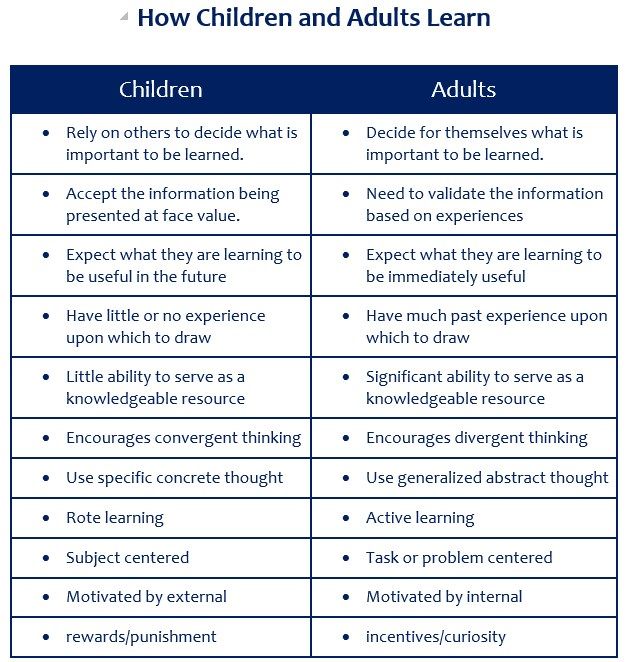How to write a child custody reference letter
Character Reference Letter for Court: Child Custody Template
A character reference letter to the court can be an important part of a disputed custody case.
If you're a parent pursing child custody, it's important you understand who you should ask to write a letter and how it can impact your case.
If you've been asked to write to the judge, use our sample character reference letter and fill-in-the-blank template.
What's a character reference letter?
Sometimes simply called a character letter, this letter is official legal testimony used as evidence in some child custody cases.
Similar to a declaration letter, it's a statement to the judge that supports a parent's requested custody arrangements. However, unlike a declaration letter, a character reference letter is written by someone who knows the parent (instead of the parent themself).
A character reference letter gives the judge insight into the case by offering a third party's perspective on the parent's relationship with the child. It also gives the judge more information about who the parent is, how they take care of their child and why they should have custody.
When you may need a character reference letter
Ideally, parents should work together to create their parenting plan, parenting time schedule and child support agreement.
When parents can't agree on custody, a judge (or other court official, such as a magistrate) decides the custody orders. Each parent submits paperwork to the court detailing the arrangements they want, along with evidence to prove that their proposed arrangement is best for the child.
Both parents can submit a character reference letter as part of this paperwork. The letters are typically optional, but one can go a long way in helping the judge understand you and your parenting.
In high-conflict cases where parents make allegations against each other, character reference letters can help the judge get more information.
You may also need a character reference letter if you have issues that can cause a parent to lose custody, such as a DUI conviction or criminal record.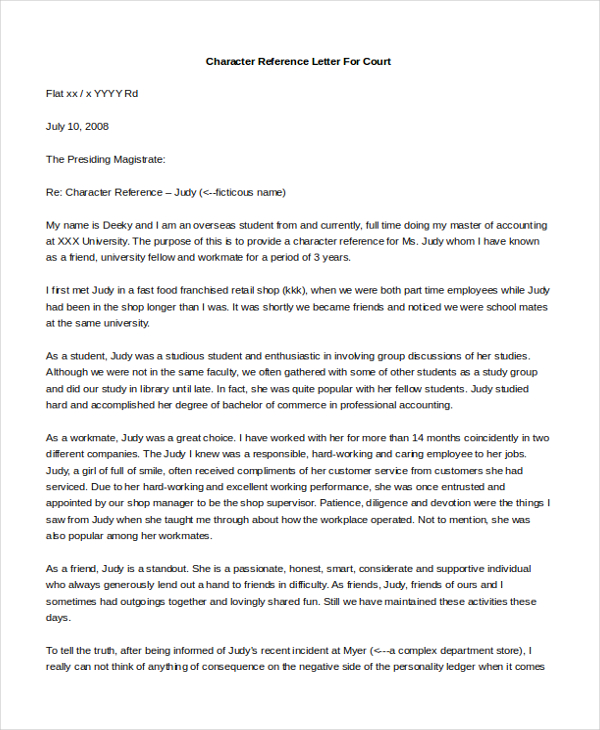 A strong character reference letter showing how the issues are in the past and do not affect your parenting can be crucial in these situations.
A strong character reference letter showing how the issues are in the past and do not affect your parenting can be crucial in these situations.
Who should write a character reference letter for a custody case
Your character reference letter writer is a witness on your behalf — they should know you well, have first-hand knowledge of your relationship with your child and support your custody requests. They should be someone who has frequently observed your parenting and who can authentically speak to your character.
Common character letter writers include close relatives, friends, co-workers and supervisors. You might also ask your child's teacher or caregiver if they know you well and have personal knowledge of your parenting. Be sure to choose someone who has known you for several years and who is credible in the eyes of the court.
If you want your character reference letter to address substance abuse or a similar issue, you might ask your sponsor or therapist.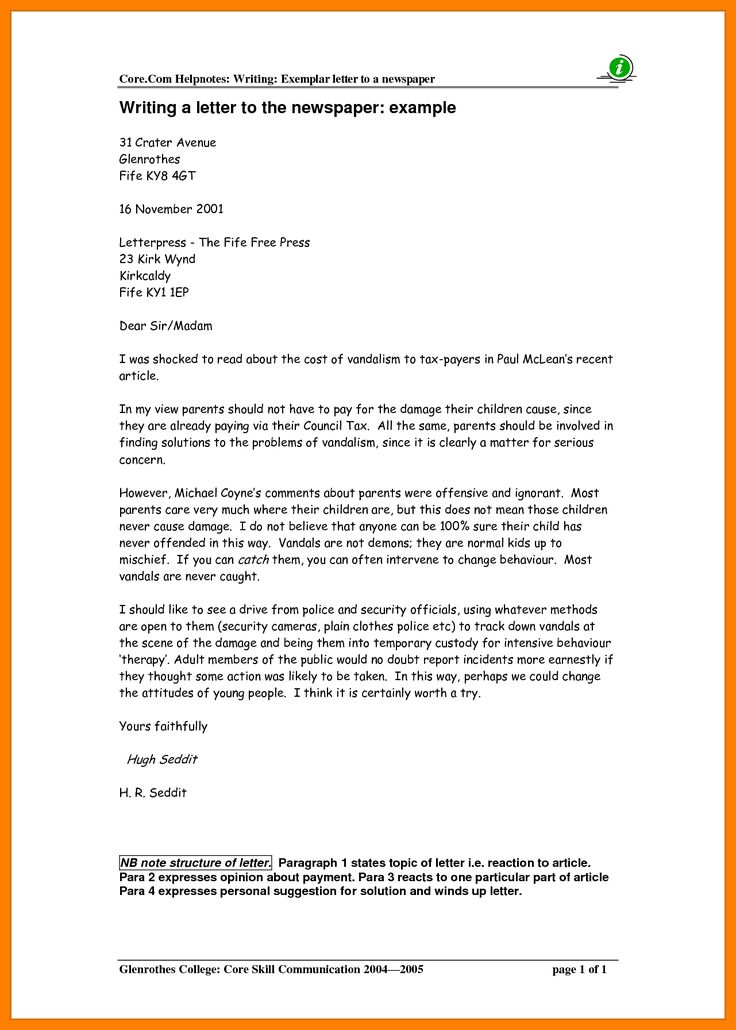 Just make sure they have observed you interacting with your child.
Just make sure they have observed you interacting with your child.
If you have a lawyer, they'll give you guidance on whom you should ask and what issues the letter should address. They may advise you to get letters from more than one person.
Tips when asking someone to write a character reference letter
When asking someone to write a character reference letter for you:
- Give them plenty of notice.
- Provide them with your court's requirements (e.g., format, page length, if the letter needs to be sealed in an envelope).
- Make sure they understand that the letter will be used as evidence in your case and become part of the official court record.
- Give them background information about your case and explain that judges make custody decisions based on the best interests of the child.
- Share this article with them, along with its downloadable example and template.
How to write a character reference letter to a judge regarding custody
If you've been asked to write a character reference letter to a judge in a custody case, be sure you're clear on the court's requirements and exactly what your letter needs to include.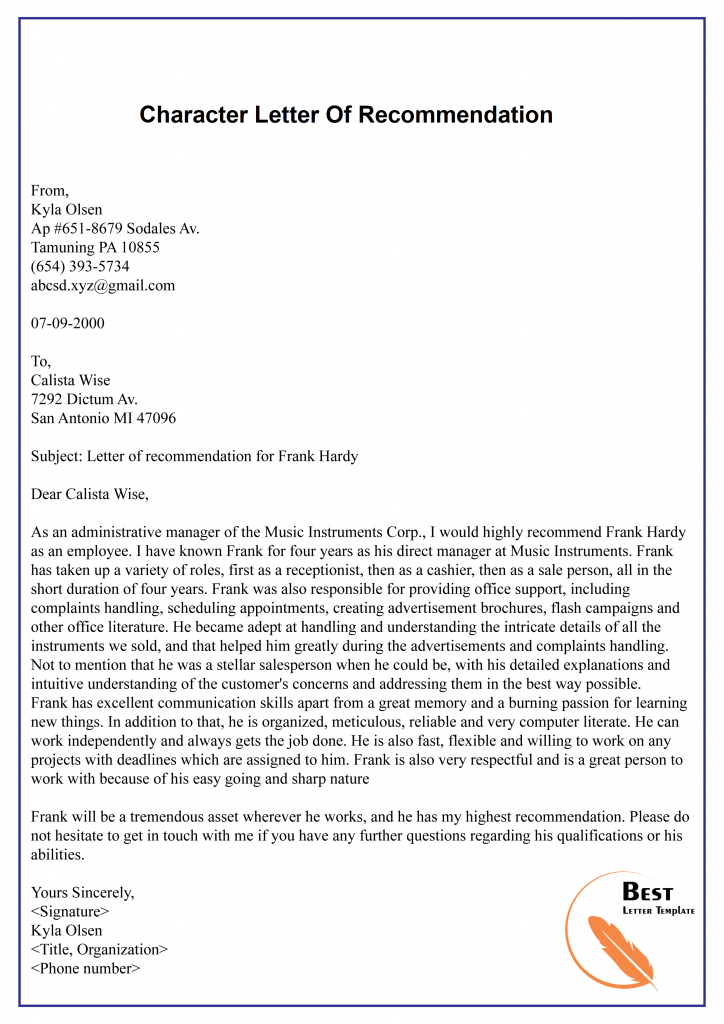
Character reference letters are usually a page long (two pages max).
As you prepare to write, brainstorm what you know about the parent and make a list of information and examples you want to include. Create an outline to organize your ideas.
After writing a draft, make sure you followed your outline and the organization flows logically. Use spell- and grammar-checking tools, and proofread carefully.
Remember that writing a character reference makes you a witness in the case, so take your role and the letter seriously.
How to format a character reference letter
A typical character reference letter has the following organization.
Heading and salutation: Use business-letter formatting and include information required by the court, such as the case number. The proper form of address for a judge is "To the honorable Judge," followed by their last name.
Introduction (1 paragraph): State the name of the parent on whose behalf you're writing, explain how you know them and for how long. Clearly state your overall assessment of the parent's character and parenting, and finish the introduction with a statement in support of the parent's custody requests.
Clearly state your overall assessment of the parent's character and parenting, and finish the introduction with a statement in support of the parent's custody requests.
Supporting facts and examples (2–3 paragraphs): Give more details about how you know the parent, your assessment of their character and their relationship with their child.
Share examples that demonstrate how the parent cares for their child and supports their best interests. Highlight the parent's strengths, and show how they play an active role in their child's upbringing and overall well-being. Be specific, and focus on the parent–child relationship.
Conclusion (1 paragraph): Clearly restate your support of the parent's custody requests. Reiterate their strengths and commitment to supporting their child's best interests.
Closing & signature: Thank the judge for their time and consideration. Sign as you would a business letter. You typically don't need to have your letter notarized.
Keep in mind that some courts or judges prefer confidential letters with the writer's signature across the envelope seal (proving that it hasn't been opened). Ask the parent for whom you're writing the letter if this is necessary.
Downloadable example and template
Below, find a sample character reference letter and a character reference letter template that you can customize. Keep in mind that court requirements and preferences vary.
- Character reference letter sample
- Character reference letter template
The tools you need for custody court
The Custody X Change app has many tools to help with your child custody case.
- Create a detailed parenting plan that shows your requested legal custody arrangements and co-parenting rules in airtight legal language, demonstrating your competency.
- Make a custom parenting time schedule to show the judge the exact physical custody arrangement you want.
- Keep a custody journal to electronically organize evidence, document incidents and keep a record of co-parenting issues.

- Track actual parenting time and get reports to show the judge exactly how much time each parent spends with your child.
- Use the parent messaging tool to keep an accurate record of your conversations with the other parent.
- Link your account to your lawyer's and print your journal, parenting time reports and messages so you can submit them to the court as evidence.
Custody X Change is software that creates professional parenting plan documents and parenting schedules.
Make My PlanHow to Write a Character Reference for Child Custody
By Samantha Kemp Updated March 19, 2019
Thomas Northcut/Photodisc/Getty Images
In a child custody case, a judge or case evaluator may assess what is in the child's best interests to determine which parent should receive custody of your child. A parent might ask a neighbor, school teacher, caretaker, relative or other individual who has seen the child and parent interact to write a character reference letter to help sway the judge to give him custody of the child.
Say Who You Are
The opening of the reference letter should identify both you and your relationship to the person who asked you to write the letter. It's not necessary to state that the parent asked you to write the letter. In fact, letters from third parties who do not demonstrate a vested interest in the outcome – other than what is in the child's best interests – can be of great value in child custody cases. Rather than saying you are writing at the parent's request, you may want to use language that demonstrates your belief in the parent.
Cite the Parent's Attributes
Family courts and the individuals who work in the court system, like case evaluators or guardian ad litems, have the duty to determine what is in the best interest of the child. States consider the health, safety and welfare of the child in their considerations. In fact, about 21 states and the District of Columbia have lists of specific factors to determine what is in the best interest of the child.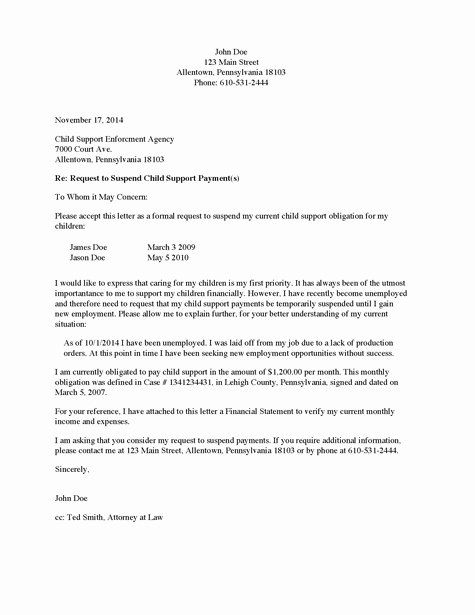 To make a compelling reference letter, you can review these factors and cite the parent's attributes that correspond to them best. For example, if the state considers the child's religious education to be important, you may wish to describe the child talking what he learned in Sunday school. If an important factor is which parent was the primary caretaker, a teacher could explain that the parent always picked up and dropped off the child from school, and was always called first when the child was sick.
To make a compelling reference letter, you can review these factors and cite the parent's attributes that correspond to them best. For example, if the state considers the child's religious education to be important, you may wish to describe the child talking what he learned in Sunday school. If an important factor is which parent was the primary caretaker, a teacher could explain that the parent always picked up and dropped off the child from school, and was always called first when the child was sick.
Also Read: What Is in a "Character Letter" for a Child Custody Court Hearing?
Confirm the Relationship with Child
A good reference should serve as a witness that the parent-child relationship is warm, loving and stable. Recall events that demonstrate a strong relationship between the parent and child. For example, you could mention that the child always arrives to school on time and that you always see the parent playing with the child for a few minutes before leaving. You can also use anecdotes or short stories to demonstrate your view of the parent-child relationship. For example, you may talk about how a parent took time off to come to a school project in which parents discussed their careers.
You can also use anecdotes or short stories to demonstrate your view of the parent-child relationship. For example, you may talk about how a parent took time off to come to a school project in which parents discussed their careers.
Include a Strong Closing
A good conclusion to a reference letter states directly which parent you believe is best to have custody of the child and reiterates some of the parent's attributes that have led you to this conclusion. Include your complete contact information to the bottom of the letter, as well as the best times you can be contacted for additional information.
Things to Watch Out For
A good reference letter should focus on the strengths of one parent, not the negative traits of the other. Negatively discussing the other parent's failings may make the letter seem more biased and less objective. It's also important to keep your letter factual, based on your direct personal observations rather than things others have told you.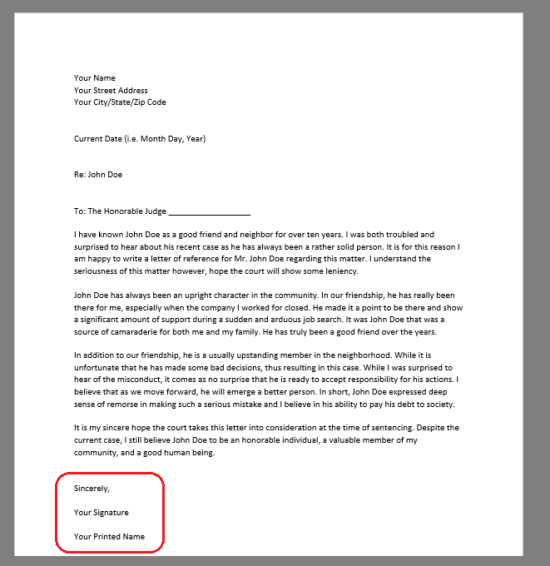 Flowery language, such as "please look into your hearts," or discussing your own religious beliefs or philosophy is not appropriate. The reference letter should be factual, concise and even-handed.
Flowery language, such as "please look into your hearts," or discussing your own religious beliefs or philosophy is not appropriate. The reference letter should be factual, concise and even-handed.
Learn More: What Is in a "Character Letter" for a Child Custody Court Hearing?
How to get custody of a child, elderly or disabled?
What is guardianship?
In Russia, citizens who need guardianship include minors, that is, children under 14, as well as persons recognized by the court as incompetent. We are talking about people who, due to a mental disorder, cannot understand the meaning of their actions or control them. This is stated by the Federal Law "On guardianship and guardianship". Based on the document, citizens appointed by the body of guardianship and guardianship "are the legal representatives of the wards, and perform on their behalf and in their interests all legally significant actions."
Guardianship is aimed at protecting the interests of the listed categories of citizens, as well as the very possibility of declaring a citizen incompetent in a judicial proceeding. This was also emphasized by the Constitutional Court in the framework of Resolution No. 15-P dated June 27, 2012 “On the case of checking the constitutionality of paragraphs 1 and 2 of Article 29, paragraph 2 of Article 31 and Article 32 of the Civil Code of the Russian Federation in connection with the complaint of citizen I.B. Business". nine0009
This was also emphasized by the Constitutional Court in the framework of Resolution No. 15-P dated June 27, 2012 “On the case of checking the constitutionality of paragraphs 1 and 2 of Article 29, paragraph 2 of Article 31 and Article 32 of the Civil Code of the Russian Federation in connection with the complaint of citizen I.B. Business". nine0009
How is guardianship different from guardianship?
In addition to guardianship, there is also guardianship, under which adolescents aged 14 to 18, as well as persons with limited legal capacity, can fall. Such people cannot be fully responsible for their actions. This category has more rights than minors and the incapacitated. For example, they can independently perform small everyday transactions and actions provided for by law (dispose of their own income, etc.). However, in other cases, they are obliged to assist the trustee. nine0009
It turns out that the guardian has more rights and obligations than the guardian, and therefore a greater responsibility falls on him.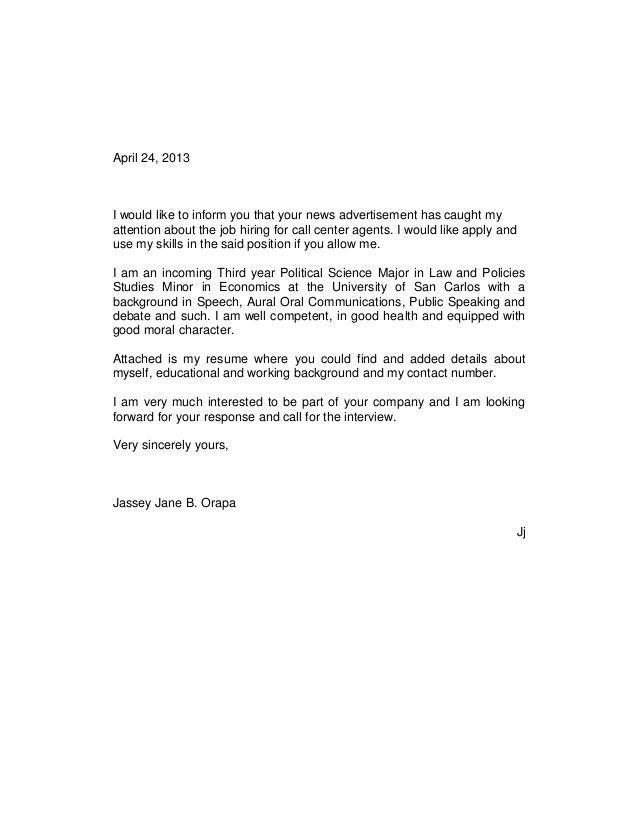
Who can become a guardian or custodian?
The main requirement for the candidate is full legal capacity. And since it comes from the age of 18, the guardian must be of age. The law also establishes a list of restrictions. Guardianship cannot be issued by persons:
- deprived of parental rights;
- having an unexpunged or outstanding conviction for an intentional crime against life or health; nine0028
- who did not agree to become a guardian.
When it comes to guardianship of young children (under 14), additional restrictions are set. Future guardians must undergo special psychological, pedagogical and legal training, as well as prove that they are in a bisexual marriage. Those who have registered a same-sex marriage in the territory of another state will not be able to arrange guardianship.
Arranging child custody
This process is supervised by guardianship authorities. To find out all the details of the procedure, you must contact the district office.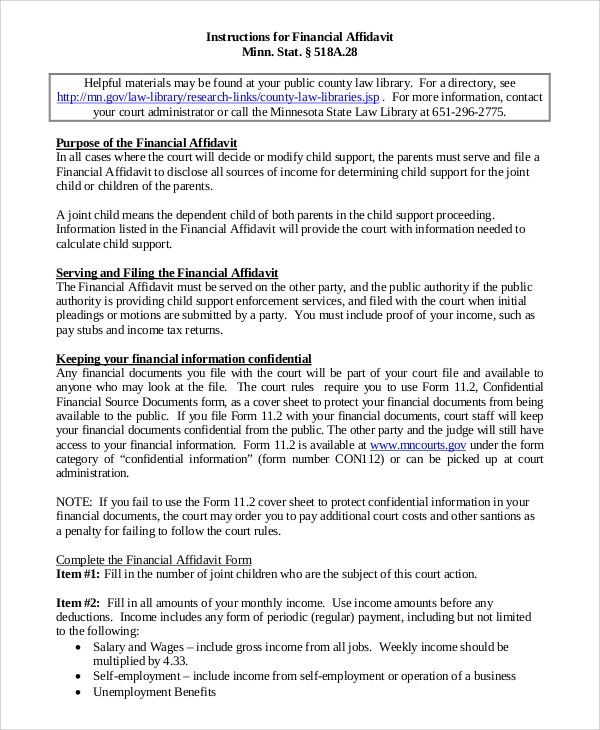 The state is interested in ensuring that children are not left unattended, are not placed in orphanages and boarding schools, and therefore, most likely, those who wish to arrange guardianship will be met halfway and will be helped in every possible way.
The state is interested in ensuring that children are not left unattended, are not placed in orphanages and boarding schools, and therefore, most likely, those who wish to arrange guardianship will be met halfway and will be helped in every possible way.
The candidate needs to write an application, collect documents confirming, among other things, the passage of special training, and in case of a positive answer, sign an agreement. nine0009
How can I get guardianship of an elderly incapacitated person?
The algorithm is the same as for children - the guardianship and guardianship authority will also deal with the issue of guardianship. However, there are also differences. Thus, custody of an elderly or adult person does not always involve the joint residence of the guardian and his ward. This issue is decided individually, but cohabitation, of course, is welcome. It is much easier for a guardian to fulfill his duties and provide supervision, especially when it comes to a pensioner who, most likely, has a sufficient number of health problems. nine0009
nine0009
If cohabitation is intended, the consent of all members of the guardian's family living with him in the same dwelling, including children aged 10 years, must be obtained.
How to get paid guardianship?
There are two types of guardianship:
- free of charge;
- paid.
In the first case, nothing is paid to the guardian. Paid guardianship can have quite flexible conditions, which are fixed by the contract. In accordance with Article 16 of the Federal Law “On Custody and Custody”, remuneration can also be paid at the expense of third parties, from the income from the property of the ward (no more than 5% and only if he is already an adult), as well as from the budget . nine0009
Features of the legal status
The guardian has an unlimited range of powers - he represents the interests of the ward in any relationship, no matter what is discussed. Moreover, this rule applies even when registering custody of a minor with living parents. If the ward is a child, then the guardian acts as a father or mother. However, in some cases notification of guardianship authorities is required. They can also establish restrictions on the actions of the guardian or, conversely, oblige him to perform any actions. All this is recorded in the act on the appointment of a guardian or custodian, or in an agreement on the implementation of guardianship or guardianship. nine0009
If the ward is a child, then the guardian acts as a father or mother. However, in some cases notification of guardianship authorities is required. They can also establish restrictions on the actions of the guardian or, conversely, oblige him to perform any actions. All this is recorded in the act on the appointment of a guardian or custodian, or in an agreement on the implementation of guardianship or guardianship. nine0009
What documents are required for registration of guardianship?
- Written statement of consent to the establishment of guardianship.
- Documents of the guardian: proof of identity, proof of income, no criminal record, state of health (medical report in the form established for persons wishing to obtain guardianship), marital status and the right to use the living quarters.
- Consent of family members of the future guardian, including children under 10 years old (provided they live with the guardian in the same territory) to live together with the ward.
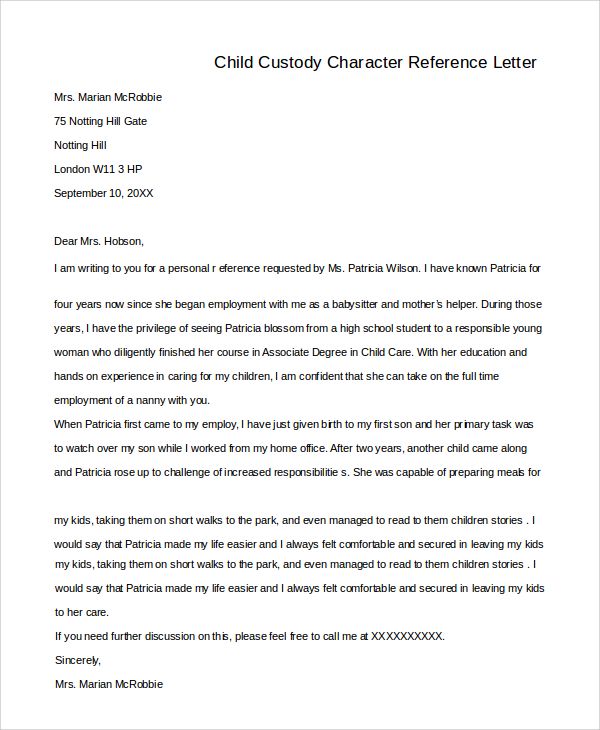 nine0028
nine0028 - Documents of the ward: identification, income, from the place of study or work, medical certificates.
- Documents confirming kinship, if the candidate is a relative.
A complete list can be found on the State Services portal, which contains clarifications on the design and number of copies of documents. You can apply for guardianship there.
How often are post-custodial checks carried out?
- First month of guardianship - 1 check.
- First year of guardianship - 4 checks (every 3 months).
- Then - once every 6 months.
Image source: pixabay.com
Documents for registration of guardianship (guardianship) over minors
Intracity municipality
of the federal city of St. Petersburg
of the municipal district
Gagarinskoe
nine0009-
Events -
General Documents -
Appeal of citizens -
Anti-corruption -
Useful information -
Contacts
| | A citizen who has expressed a desire to become a guardian (trustee)of a minor provides the following documents to the guardianship and guardianship authority at the place of residence:
|



